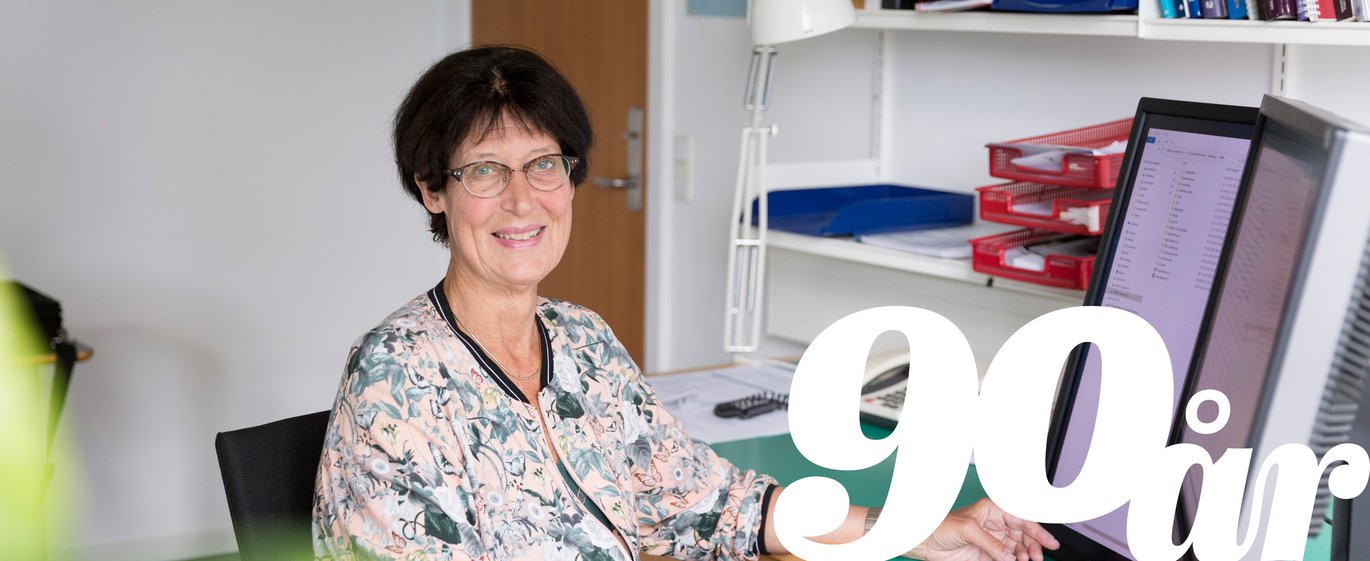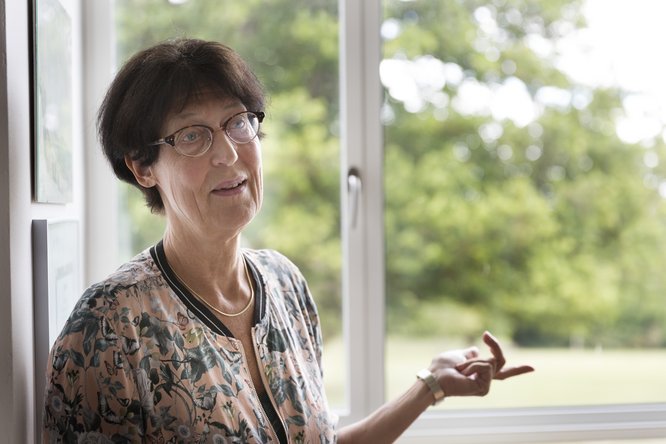“Thanks to the happiness of the young, I’ll never become a bitter old lady”
Same procedure as last year...? No, because unlike Miss Sophie in Dinner for One, AU doesn’t turn 90 every year. Omnibus is celebrating the university’s 90th with a series of short interviews with employees about their relationship to the university.

AU’s 90th
- “In the hope that that the scientific and scholarly research which shall take place here may take place in spirit and truth, I hereby inaugurate Aarhus University.”
- King Christian X inaugurated the first university in Jutland with these words, on 11 September 1933. The very university where you work – or study: Aarhus University.
- Omnibus is celebrating AU’s 90th birthday with a series of short interviews: we asked AU employees to answer three questions about their relationship to the university. And about their birthday wishes for the guest of honor.
- Together with university historian Palle Lykke, we’ve also delved into the archives to find photos from the first nine decades at AU. They’re accompanied by a short text by Palle that illuminates the high points (and low points) documented by the photographer’s lens over the years.
- And we’ve asked the photographers from AU Photo to revisit the same spots to show you what they look like today. The anniversary series ‘AU’s 90th’ will run throughout the autumn.
Ann Wenzel, professor of odontology at the School of Dentistry – which became a department at AU in 1992 – since 1978.
Why are you still here?
“Because it’s still fun. What’s especially fun is watching the youngest researchers grow and develop their skills, working with them and being part of their successes. We’ve just come back from an international congress where our sole PhD student and one of our scholars (odontology degree students who spend a year doing research, ed.) came home with a first prize and a second prize in two different competitions. These kinds of successes make the atmosphere even better, and they mean that students think it’s fun working as a researcher. Thanks to that, and the happiness of the young, I’ll never become a bitter old lady.”
And there’s no reason for bitterness in any case, Wenzel believes. In the course of her 40 years on the job, she’s experienced the School of Dentistry both before and after the merger with AU – and by and large, the merger has turned out for the better.
“I’m not one of those people who thinks everything was better before we became part of AU. Of course, we have to compete with medicine, for example, for research funding, and that can be hard. Normally, our patients don’t die of their illnesses, and it can be challenging to attract funding to do research on teeth and mouths if you’re in competition with a cancer scientist. But becoming part of the AU family has really opened a lot of doors, for example because it gives us the possibility of applying for money from internal funding pools for our junior researchers, and in that respect, I feel that the needs of our department are well-met.”
What’s your favorite spot at AU?
Actually it’s right here, at my office. My view is one of the best you can have, looking out over Vennelystparken, and our research group holds a lot of brainstorming sessions here by the window. I’ve had an office on the same corridor throughout my time at the School of Dentistry, and almost always an office facing the park. I’m very pleased about that.”
What is your birthday wish for AU?
“Well, Brian (rector Brian Bech Nielsen, ed.) says that we need to pull ourselves up higher in the international rankings, and we do need to. If we can attract the most qualified international researchers to AU, we can improve the quality of our research so that we also become more qualified ourselves, to the benefit of society. That creates a positive circle that would attract even more people to AU. At the same time, it’s important that we work out a good balance between international and Danish talents. We also need qualified Danish researchers who can deliver high-quality teaching in Danish, and who can advise Danish government agencies and institutions. For example, for doctors and dentists, patient records have to be written in Danish. To be able to use the language of public administration and law competently, you almost have to have grown up in Denmark, and so it’s not an option to only have international researchers within a particular specialisation. The balance is important, and this also applies to the new rules on research abroad for PhDs the management is looking at. Sending the PhD students abroad to do research is a really fine idea, but we need to consider the demands we make carefully, so that there’s still room for PhD students to have a family. It’s particularly important in a field like dentistry – where the salary level at the university can’t compete at all with the private job market – to make sure that the path through a PhD programme isn’t paved with too many obstacles.”

Photo: Ida Marie Jensen.
Translated by Lenore Messick
AU’s 90th
- “In the hope that that the scientific and scholarly research which shall take place here may take place in spirit and truth, I hereby inaugurate Aarhus University.”
- King Christian X inaugurated the first university in Jutland with these words, on 11 September 1933. The very university where you work – or study: Aarhus University.
- Omnibus is celebrating AU’s 90th birthday with a series of short interviews: we asked AU employees to answer three questions about their relationship to the university. And about their birthday wishes for the guest of honor.
- Together with university historian Palle Lykke, we’ve also delved into the archives to find photos from the first nine decades at AU. They’re accompanied by a short text by Palle that illuminates the high points (and low points) documented by the photographer’s lens over the years.
- And we’ve asked the photographers from AU Photo to revisit the same spots to show you what they look like today. The anniversary series ‘AU’s 90th’ will run throughout the autumn.

